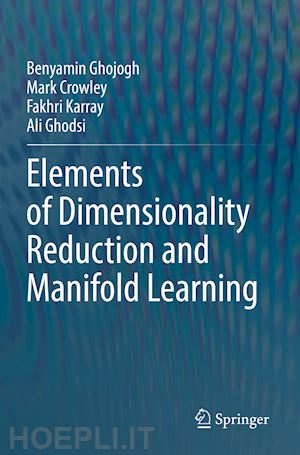
Questo prodotto usufruisce delle SPEDIZIONI GRATIS
selezionando l'opzione Corriere Veloce in fase di ordine.
Pagabile anche con Carta della cultura giovani e del merito, 18App Bonus Cultura e Carta del Docente
Benyamin Ghojogh received the B.Sc. degree in electrical engineering from the Amirkabir University of Technology, Tehran, Iran, in 2015, the M.Sc. degree in electrical engineering from the Sharif University of Technology, Tehran, Iran, in 2017, and the Ph.D. in electrical and computer engineering (in the area of pattern analysis and machine intelligence) from the University of Waterloo, Waterloo, ON, Canada, in 2021. He was a postdoctoral fellow, focusing on machine learning, at the University of Waterloo, in 2021. His research interests include machine learning, dimensionality reduction, manifold learning, computer vision, data science, and deep learning.
Mark Crowley:
Mark Crowley has a PhD in Computer Science from the University of British Columbia and was a postdoctoral fellow at the Oregon State University. He is now an Associate Professor in the Department of Electrical and Computer Engineering at the University of Waterloo and regularly teaches undergraduate and graduate courses on software programming, artificial intelligence, and data analysis. He is a member of the Waterloo Artificial Intelligence Institute. He carries out research to find dependable and transparent ways to augment human decision making in complex domains, especially in the presence of spatial structure, streaming data, and uncertainty. His research group focuses on developing new algorithms within the fields of reinforcement learning, deep learning, and manifold learning. This often involves collaboration with industry and policy makers in diverse fields such as sustainable forest management, ecology, autonomous driving, physical chemistry, and medical imaging.
Fakhri Karray:
Fakhreddine (Fakhri) Karray is the Loblaws Research Chair in Artificial Intelligence in the department of electrical and computer engineering at the University of Waterloo, Canada. He is the founding co-director of the University of Waterloo AI Institute. He is currently serving as the Provost and Professor of Machine Learning at the Mohamed bin Zayed University of Artificial Intelligence, a first of its kind graduate level, research based artificial intelligence university. Fakhri’s research interests are in the areas of advances in machine learning, operational AI, cognitive machines, natural human-machine interaction, autonomous and intelligent systems. Applications of his research include virtual care systems, cognitive and self-aware machines/robots/vehicles, predictive analytics in supply chain management and intelligent transportation systems. Recent work of Fakhri and his research team on deep learning-based driver behavior recognition and prediction has been featured on The Washington Post, Wired Magazine, Globe and Mail, CBC radio and Canada's Discovery Channel. He was honored in 2021 by the IEEE Vehicular Technology Society (VTS) for his novel work on improving traffic flow prediction using weather Information in connected cars through deep learning and tools of AI and received the Society’s 2021 Best Land Transportation Paper Award.
Fakhri is the co-author of a textbook on applied artificial intelligence: Soft Computing and Intelligent Systems Design (Pearson Education Publishing, 2004). He has published extensively in the general field of pattern analysis and machine intelligence and is the author of 20 US registered patents. He is the Associate Editor (AE) of flagship journals in the field of AI and intelligent systems, including the IEEE Transactions on Cybernetics, the IEEE Transactions on Neural Networks and Learning Systems and the IEEE Computational Intelligence Magazine. He served as the AE and Guest Editor for the IEEE Transactions on Mechatronics, the IEEE Computational Intelligence Magazine and IEEE Access (special issue on IoMT). He also serves on several editorial boards of AI-related journals and has served as the General Chair/ProgramChair for several international conferences in the field of intelligent systems. Fakhri is the co-founder and Chief Scientist of Yourika.ai, a provider of AI based online learning systems. He is a Fellow of the IEEE, a Fellow of the Canadian Academy of Engineering, a Fellow of the Engineering Institute of Canada and a Fellow of the Kavli Frontiers of. He received his PhD from the University of Illinois Urbana-Champaign, USA, and completed his undergraduate engineering degree at the National Engineering School of Tunis, Tunisia.
Ali Ghodsi:
Ali Ghodsi is a Professor of Statistics and Computer Science at the University of Waterloo in Ontario, Canada, and a member of the Waterloo Artificial Intelligence Institute. His current research sweeps across a broad swath of AI encompassing machine learning, deep learning, and dimensionality reduction. He regularly teaches courses on these topics. He studies theoretical frameworks and develops new machine-learning algorithm











Il sito utilizza cookie ed altri strumenti di tracciamento che raccolgono informazioni dal dispositivo dell’utente. Oltre ai cookie tecnici ed analitici aggregati, strettamente necessari per il funzionamento di questo sito web, previo consenso dell’utente possono essere installati cookie di profilazione e marketing e cookie dei social media. Cliccando su “Accetto tutti i cookie” saranno attivate tutte le categorie di cookie. Per accettare solo deterninate categorie di cookie, cliccare invece su “Impostazioni cookie”. Chiudendo il banner o continuando a navigare saranno installati solo cookie tecnici. Per maggiori dettagli, consultare la Cookie Policy.